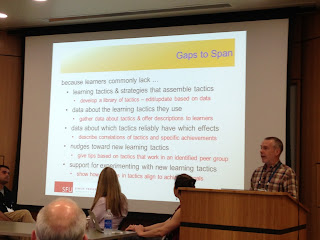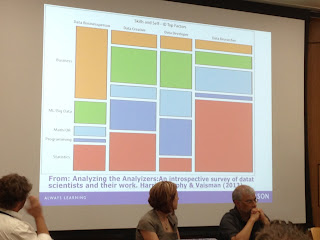Using Learning Analytics to Illuminate Student Learning pathways in an Online Fraction Game
Taylor Martin, Nicole Velasquez
activelearninglab.org
created games to help students understand fractions. see http://play.centerforgamescience.org/refraction/site/
looks much like the game my grandsons love to play - use laser beams to divide up screen to get fractions eg half of a half of a half is an eighth.
used analytics to look for clusters of approaches
cluster 1 - minimal (careful, slow approach) low success rate
2 - Haphazard trying a lot, moving around a lot, success low.
3 - explorers (some iterations but not a lot, thoughtful) medium level success
4 - strategic explorer (exploring a lot of things quickly) success high
5 - careful - take medium time, considered, go straight to solution
post-test score not associated with strategy
Self-regulated learning and trace data,
Phil Winne
Basic idea is that learners lack tactics and strategies. They also don't have data about their learning tactics, or about which tactics have effects.
See
Winne (2011) - Cognitive & Metacognitive Analysis of Self-Regulated Learning
bit.ly/19Y1OAW
Demonstrated nStudy software that enables students to create bookmarks, highlight and save quotes, tags, notes, documents, concept maps. tool for learners to engage and share information.
Affect and engagement during learning,
Sidney D’Mello
tracking emotions in learning
study learning contexts
note affective states
develop computational models
take home message
confusion can be beneficial to learning
Building the educational data scientist
Ryan Baker, Piotr Mitros, Marcelo Worsley
Ryan
Creating a grad program MS in Learning Analytics but has to be approved by NY state. Interime Masters in Cog Studies in Ed, Focus in LA.
@ Teachers College, Columbia University
Creating a Masters in Learning Analytics, but for regulatory reasons Master of Cognitive Science with a focus on LA
Everything (curriculum etc) will be open access
(note his forthcoming MOOC on big data in Education)
Marcelo
www.lse.cs.cmu.edu
Piotr
(Chief Scientist at edX)
what employers want
complex problems solving
communication,
critical thinking,
ability to get things done.
also some core skills:
mathematical maturity
informatice
cognitive science and communications
need to give a more broad theoretical background and tie back to learning - but with a focus on data
edX has zero people as 'data scientists' neither does Udacity
John reminds us of the different mix of skills required for different roles as per the analysers book.
(image not so clear so here are the horizontal (roles) and vertical (skills) headings - ie red blocks are statistical knowledge required)
Data business person data creative data developer data researcher
Business
Big Data
Math/OR
Programming
Statistics
discussion
- importance of data curators - requires skills and knowledge of: ontology, database design, meta-data structures, technical sides of storage, legal requirements, records management etc
- also need to highlight importance of empirical research methods - used in conjunction with data mining
- critique - lots of discussions about 'techniques', not much about ethics etc.
- Q to Piotr re no data scientists - says they built on Google experience: hired people who are talented, have communications skills etc
University of Michigan UG program School of Information's UGrad program
+---
Panel: Funding and Institutional Support – CERAS 101
Chair: Taylor Martin
Speakers: Edith Gummer (NSF), Ed Dieterlie (Bill and Melinda Gates Foundation), Suzi Hewlett (Australian Office of Learning & Teaching), Susie Vaks DePianto (Google)
Edith
Data-intensive research to improve learning and teaching
Data Intensive Ideas Lab
Ed from Gates Foundation
Funding & Institutional Support
Central goal in K-12 is for 80% or more to graduate college-ready. Currently 55M students in K12 pipeline, many behind and likely not to graduate high school college ready. Want to accelerate learning and get students back on track. Each year 4.2M children enter K.
Breakthroughs leading us closer to personalisation of learning for all learners. called it a confluence of breakthroughs moving us closer to the personalisation of learning for all learners
One of these is hexagons is Advanced Learning Analytics
This is why they have invested in this event.
frameworks for puzzling through a potential investment
optimism - taking on messy challenges NEED
collaboration - if you want to run fast, run alone, if you want to run far, run together APPROACH
rigor - BENEFIT (what will you compare your work to?)
innovation - ALTERNATIVES
Map of building blocks
building blocks
Suzi Hewlett
Good overview of OLT's program.






No comments:
Post a Comment